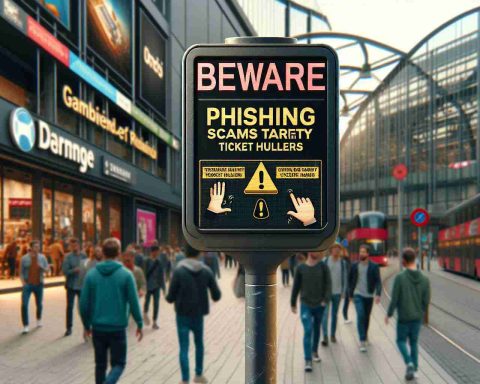- The Deutschlandticket’s price increase has led to an uptick in phishing scams targeting ticket holders.
- Fraudulent emails claim recipients are owed a refund, creating a false sense of urgency.
- Do not engage with suspicious emails; delete them or mark them as spam.
- Check your actual bank statements for any double charges, rather than trusting unsolicited emails.
- Phishing scams typically lead victims to sites that demand sensitive information, putting them at risk.
- Be cautious of red flags: urgency, threats, and requests for personal details are all indicators of phishing attempts.
- Official organizations will never ask for sensitive information through email.
In the bustling world of travel, a new danger lurks in your inbox: cunning phishers targeting Germany ticket holders. The beloved Deutschlandticket, which began as a fantastic deal, is now the center of a deceptive scheme that could cost you dearly.
With the ticket’s price increasing from €49 to €58, deceitful emails are making waves. These fraudulent messages claim that recipients are entitled to a refund of €58 due to a double charge from September. The subject line screams urgency, urging readers to “confirm your refund now!” It sounds tempting, but it’s a trap.
The Consumer Center warns: do not engage! If you receive such an email, delete it immediately or send it to your spam folder. To check for any actual double charges, just glance at your bank statement from that month.
Inside these phishing scams, victims are lured to a deceptive site that only offers one “refund option.” Once clicked, it prompts victims to verify their bank details. In a split second, your sensitive information could fall into the hands of criminals. If you upload your data, act fast: contact your bank to safeguard your finances.
Always stay vigilant! Phishing schemes have evolved, but the warning signs remain. A sense of urgency, threats of consequence, and requests for personal information are red flags. Remember, official entities never ask for sensitive data via email, so think twice before clicking any links.
Stay informed, stay safe, and never let a scammer steal your journey!
Beware the New Wave of Phishing Scams Targeting Germany Ticket Holders!
In the rapidly changing landscape of travel and ticketing, a new and elaborate phishing scheme is making headlines as it preys on consumers who use the Deutschlandticket. Initially introduced as an affordable and convenient option for travelers in Germany, this beloved ticket is now being exploited by savvy scammers. This article dives deeper into the current situation, potential impacts, and preventive measures against these scams.
Current Trends in Phishing Scams
1. Increased Sophistication: Modern phishing scams have taken on more sophisticated forms. Scammers now use the guise of legitimate entities, often mimicking the language and branding of known organizations to gain trust.
2. Use of Emotional Triggers: These fraudsters utilize emotional tactics such as urgency and fear to prompt quick action. For instance, claims of double charges or limited-time refunds are common.
3. Rise in Digital Transactions: As digital transactions have surged post-pandemic, phishing attempts have also elevated in frequency, making it crucial for users to remain vigilant.
How to Recognize a Phishing Attempt
– Urgent Language: Messages urging immediate action, such as confirming refunds or penalties for inaction, are often scams.
– Sender’s Email Address: Check the sender’s email address carefully. Legitimate organizations usually have official domain names, while phishing emails often originate from generic addresses.
– Generic Greetings: Phishing emails often lack personalization and address users generically rather than by their name.
Prevention Strategies
– Never Click Suspicious Links: If an email prompts you to click a link, it’s safer to navigate directly to the official site instead.
– Enable Two-Factor Authentication (2FA): Adding an extra layer of security through 2FA can significantly reduce your chances of falling victim to a phishing attack.
– Monitor Financial Statements Regularly: Keep an eye on your banking and credit card statements to spot any unauthorized charges promptly.
Frequently Asked Questions
1. What should I do if I think I’ve been a victim of phishing?
If you suspect you have been targeted, immediately change your passwords, enable 2FA, and inform your bank about the potential breach. Monitoring your financial transactions is crucial.
2. Are there specific signs that distinguish phishing emails from legitimate ones?
Yes, look out for poor grammar, spelling errors, and unprofessional design. Genuine communications from companies are usually well-formatted and free from mistakes.
3. How can I report a phishing attempt?
You can report phishing emails to your email provider and to organizations like the Federal Trade Commission (FTC) or local consumer protection agencies.
Conclusion
As the Deutschlandticket phishing incidents illustrate, staying informed and educated about common online scams is vital. While technology continues to evolve, so too do the tactics employed by cybercriminals. Always remain skeptical of unsolicited emails, especially those that ask for sensitive information or create a false sense of urgency. Together, we can combat these threats and keep our digital transactions secure.
For additional information on cybersecurity and travel safety, check out Consumer FTC for the latest updates and tips to protect yourself.


















